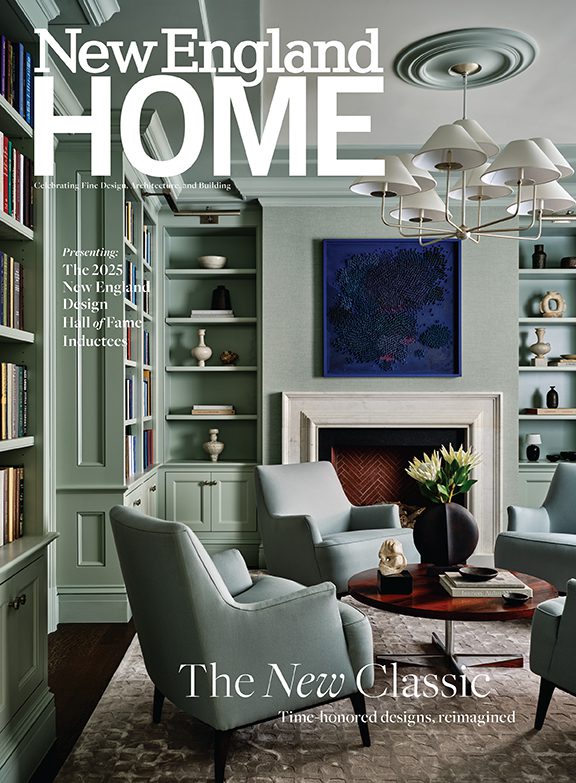Looking Forward
September 3, 2009
Text by Christine Temin Photography by Portrait by Webb Chappell
The home page of Michael Mazur’s Web site displays a photograph of the artist sitting in front of one of his lyrical landscapes. Below the photo is a single line of text from the famous Jewish leader Rabbi Hillel: “Those who do not grow, grow smaller.”
“I get very impatient if I’m not trying to push the work ahead,” Mazur explains.
Mazur has spent his entire life growing as an artist, becoming a celebrated painter and printmaker. He is not afraid of change, nor is he afraid of beauty; much of his work is unabashedly luscious. In many of his pieces, oil paints drizzle down the canvas, evoking a sense of fluidity even if the painting doesn’t directly represent the water that has been one of his favorite subjects.
“Fluidity is the story in much of my work,” he says. “I like thinner paint because it drips, and the drips take the eye down with them.”
While best known for his gorgeous paintings and prints of flowers, trees and other elements of the natural world, Mazur’s career is bracketed by darker fare: black-and-white prints of the depressed and isolated inmates of a psychiatric hospital in the 1960s, and, more recently, a series of paintings that depict the horrors of war. Between those two episodes, the subjects of the black-and-white works had started to soften, as in his monotypes of gracefully nodding calla lilies. And color came into his work. Flowers became a central subject. “Not for their color, but for their form,” he says. “The curves in flowers or plants tend to demand different speeds, slower or faster. They are like calligraphy and demand a certain precision.”
Mazur's work from 1960 to 1980 was primarily figurative. “In 1993 there was a real change, although I've never thought of my work as abstract,” he says. “The word abstract has very little meaning for me. My tendency is to prefer the distinction between narrative and non-narrative.”
By the time Mazur was eight, he knew he wanted to be an artist. He had a multi-talented nanny who gave him materials, helped him learn to draw and, along with his parents, took him to museums. He went to college at Amherst, taking his senior year off to go to Florence, Italy. There he lived near a house once occupied by Dante Alighieri, the great early Renaissance Italian poet famous for The Divine Comedy. Mazur learned Italian, and on his return to the United States, read The Divine Comedy in its original language. That was in the late 1950s and was the beginning of a half-century of involvement with the work, resulting in several publications with his friend, the poet and translator Robert Pinsky.
After graduating from Amherst, he earned a BFA and an MFA from Yale University. He then began teaching, first at the Rhode Island School of Design, later at Brandeis University and Harvard. Fellowships and grants, including a Guggenheim, came his way. He participated in group and solo shows in important museums. In the early 1960s, his dealer, Boris Mirski, sold about twenty-five of his works to the Museum of Fine Arts. He walked into the print galleries and was shocked. “I was twenty-eight years old,” he recalls. “It was the first time I'd seen my work on the walls of a museum. It was mind-blowing.”
Mazur has always been politically active, co-founding Artists Against Racism and the War in 1968. He began his most recent body of work, six large black paintings about the results of war, in 2006.
When Mazur began his series, he says, “We were at a low point in the Iraq war.” At the heart of the most recent painting are a horse and rider—both headless—representing, the artist says, “the total lack of leadership in this country. The headless rider is so Bush-like.”
Surrounding the horse and rider are more than 4,000 tick marks—four short vertical lines crossed by a diagonal one, a way of counting by fives—each representing an American soldier who died in Iraq.
The series of six is a closed body of work, he says. “I won't be doing any more. If I feel like I'm imitating myself I get upset. I think we're all on a journey. It's not a treadmill.”
EDITOR'S NOTE Michael Mazur is represented locally by the Barbara Krakow Gallery, Boston, (617) 262-4490, www.barbarakrakowgallery.com, and the Albert Merola Gallery, Provincetown, Mass., (508) 487-4424, www.albertmerolagallery.com.
Share
![NEH-Logo_Black[1] NEH-Logo_Black[1]](https://b2915716.smushcdn.com/2915716/wp-content/uploads/2022/08/NEH-Logo_Black1-300x162.jpg?lossy=1&strip=1&webp=1)













You must be logged in to post a comment.